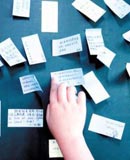不支持Flash
|
新浪教育 > 英语考试 > 2009年6月大学英语四六级考试 > 正文
2009年6月四级考试复合式听写答案(昂立)
Around 120 years ago, Ebbinghaus began his study of memory. He concentrated on studying how quickly the human mind can remember information. One result of his research is known as the total time hypnosis which simply means the amount you learn depends on the time you spend trying to learn it. This can be taken as our first rule of learning. Although it is usually true that studying for four hours is better than studying for one, there is still the question of how we should use the four hours. For example, is it better to study for four hours straight or to study for one hour a day for four days in a row? The answer as you may have suspected is that it is better to spread out the study times. This phenomenon through which we can learn more efficiently by dividing our practice time is known as the distribution of practice effect. Thus, our second rule of learning is this: it is better to study fairly briefly but often. But we are not finished yet. We haven’t considered how we should study over very short periods of time. Let’s say you are trying to learn some new and rather difficult English vocabulary using a stack of cards. Should you look at the same words in rapid succession or look at the word and have some delay before you look at it again? The answer is it is better to space out the presentations of the word you are to learn.
特别说明:由于各方面情况的不断调整与变化,新浪网所提供的所有考试信息仅供参考,敬请考生以权威部门公布的正式信息为准。
网友评论
更多关于 四六级 听力 的新闻
- 2009年6月四级考试复合式听写答案(新东方) 2009-06-20 14:29
- 09年6月英语四级翻译名师评析 2009-06-20 14:25
- 09年6月英语四级考试真题A卷参考答案(昂立版) 2009-06-20 14:20
- 2009年6月四级A卷完整答案(新东方版) 2009-06-20 14:15
- 2009年6月四级阅读答案(新东方版) 2009-06-20 14:11
- 09年四六级考试听力冲刺复习时间表2009-06-02 15:52:37
- 四六级听力备考:倒数第三周准备篇章练习2009-06-01 14:32:30
- 备考大学英语四六级:听力部分2009-04-14 11:54:18
- 名师指导:四个方法备考09年四六级听力2009-03-13 11:48:41
- 英语四六级听力中必须掌握的态度词汇2009-02-04 11:53:00
- 四六级机考首“试水”增加跟读环节听力比重大2008-12-21 17:38:29
- 名师讲解四六级听力 四级听力今年偏难(图)2008-12-20 21:11:06
- 广东200大学生尝鲜四六级机考 7成题是听力2008-12-18 17:48:40
- 四六级听力冲刺:八大宝典助你过关2008-12-16 17:41:35






